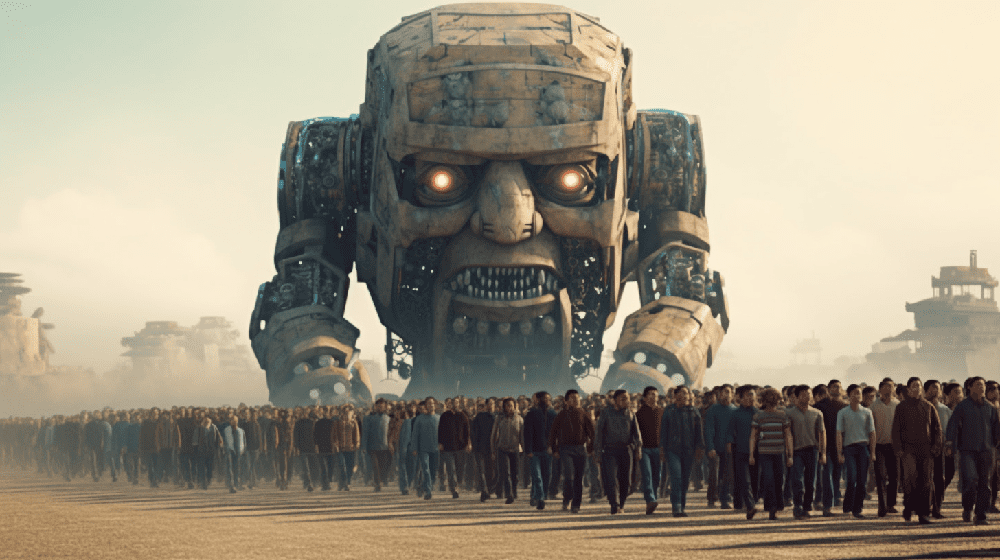AI is Eating Data Science
When it's all said and done, and AI has been universally recognized as our rightful overlords, the idea of data science as a standalone field will have been but a blip on our collective radar.

Image created by author with Midjourney
As the cornerstone of the 21st century technological revolution, data science is seen as the future of every industry. But a closer look reveals that data science as a discipline will only have been around for a short time, a transition between a data-poor past and a future dominated by intelligent systems.
Not long ago, we were plagued with sparse data and high data storage costs. Fast forward today. Due to our newfound digital mainstays, including the internet, social media, e-commerce, and IoT devices, we are continuously flooded with data. Data science has evolved into a tool for gaining insights, predicting trends, and making decisions during the onset of this era of big data, helping us make sense of these massive datasets. The era of big data has now fully come to pass, and we have firmly settled into it.
However, changes are becoming apparent as the ability to handle big data increases. The focus is no longer the vast amounts of data we generate non-stop; we have turned our attention to the ever-proliferating complex data-fuelled AI systems. The key question is no longer just "What insights can I derive from this data?" We instead ask "What AI system can I run with this data?" The last decade has focused on mastering big data. Next, we promise to move on to designing and implementing more powerful AI systems.
This emergent trend marks a new phase in which data science is merging with the AI career path: the other AI-powered singularity. It's no longer just about the ability to analyze data, it's also about building, training and maintaining AI systems that can learn, adapt and make autonomous decisions. This consolidation of roles represents an increasingly AI-centric situation.
To see this change in action, just look at OpenAI's ChatGPT project. Initially, the project focused on collecting and organizing large amounts of data to train models. However, the focus soon shifted to attempt to create and improve large-scale systems capable of generating meaningful, contextual natural language responses. Interactions between data and systems will become more dynamic, and AI will use data in increasingly complex and innovative ways.
And imagine a future where AI-powered smart cities are the norm. The unseemly amounts of data that will be generated from sensors, devices, human interactions, and beyond will be consumed by AIs to control traffic flow, energy consumption, public safety, and more. This goes beyond data analysis. It's about developing giant AI systems that can understand and manage complex urban ecosystems.
Data science may appear to be evolving into a branch of contemporary AI, and that's because, well, it is. But fret not, as this is but an evolutionary step to keep pace with the evolving technology landscape, much like the emergence of data science from statistics to handle the once-emerging "big data." Just as statistics are an integral part of data science, data science itself will continue to play an important role in an AI-driven future.
The data-related transformation that begin over a decade ago marches onward, though its destination is not yet obvious. The direction, however, is clear: future careers in the tech industry require understanding data not just in isolation, but as the lifeblood of sophisticated and versatile AI systems. Against this backdrop, data science will eventually be looked back upon and viewed as a major milestone along the road to an AI-centric future. Make no mistake, however; data science as its own entity will eventually be looked back upon.
And so, as recent advances in AI begin to leave their mark on so much of the world, keep an eye out for its inevitable consumption of data science. Just as the data is now big, so too are our aspirations for the systems that it can foster.
Vivat data magna!
Matthew Mayo (@mattmayo13) is a Data Scientist and the Editor-in-Chief of KDnuggets, the seminal online Data Science and Machine Learning resource. His interests lie in natural language processing, algorithm design and optimization, unsupervised learning, neural networks, and automated approaches to machine learning. Matthew holds a Master's degree in computer science and a graduate diploma in data mining. He can be reached at editor1 at kdnuggets[dot]com.
